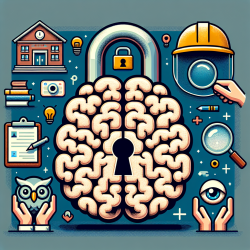Introduction
The COVID-19 pandemic has undeniably altered the landscape of our daily lives, impacting mental and physical health. For practitioners, understanding these changes is crucial in providing effective support. A recent study titled Coping during COVID-19: The Impact of Cognitive Appraisal on Problem Orientation, Coping Behaviors, Body Image, and Perceptions of Eating Behaviors and Physical Activity during the Pandemic sheds light on how cognitive appraisal influences individual responses to pandemic-related challenges.
Understanding Cognitive Appraisal
Cognitive appraisal refers to how individuals interpret and respond to stressors. The study highlights two types of appraisals: threat and opportunity. Those who perceive challenges as threats often experience negative outcomes, while those who view them as opportunities tend to adopt more adaptive coping strategies. This understanding is pivotal for practitioners aiming to foster resilience in children.
Key Findings and Implications
- Problem Orientation: Participants who viewed COVID-19 as an opportunity reported a more positive problem orientation, suggesting that cognitive appraisal can be a tool for enhancing problem-solving skills.
- Coping Strategies: Opportunity appraisals were linked to adaptive coping behaviors, whereas threat appraisals were associated with maladaptive behaviors. This insight can guide practitioners in developing interventions that encourage positive appraisals.
- Body Image: The study found that positive appraisals led to greater body appreciation and flexibility, indicating the potential for improving self-image through cognitive reframing.
Practical Applications for Practitioners
Practitioners can leverage these findings to enhance their therapeutic approaches. Here are some strategies:
- Encourage Positive Reframing: Guide children to view challenges as opportunities for growth. This can be integrated into therapy sessions through reflective exercises and journaling.
- Develop Adaptive Coping Skills: Teach children coping strategies that focus on resilience and problem-solving, helping them to manage stress more effectively.
- Focus on Body Positivity: Use cognitive appraisal techniques to improve body image, promoting self-acceptance and appreciation.
Conclusion
The study underscores the importance of cognitive appraisal in shaping individual responses to stressors. By incorporating these insights into practice, practitioners can better support children in navigating challenges, ultimately leading to improved outcomes. For those interested in delving deeper into the research, the original paper offers a comprehensive analysis of these findings.
To read the original research paper, please follow this link: Coping during COVID-19: The Impact of Cognitive Appraisal on Problem Orientation, Coping Behaviors, Body Image, and Perceptions of Eating Behaviors and Physical Activity during the Pandemic.










